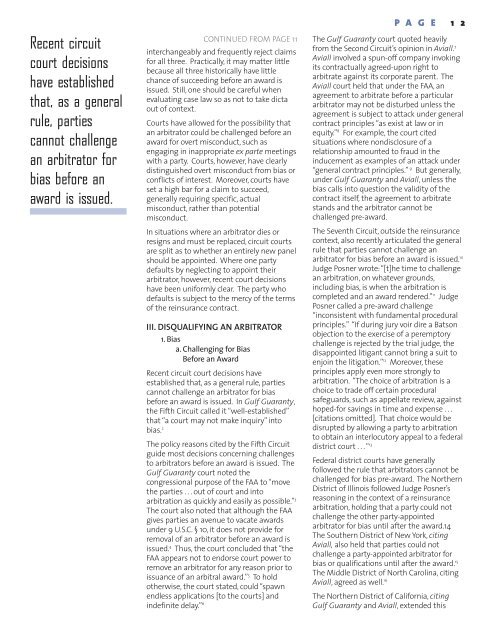FIRST QUARTER 2005 VOLUME 12 NUMBER 1 - arias·us
FIRST QUARTER 2005 VOLUME 12 NUMBER 1 - arias·us
FIRST QUARTER 2005 VOLUME 12 NUMBER 1 - arias·us
- TAGS
- volume
- arias-us.org
You also want an ePaper? Increase the reach of your titles
YUMPU automatically turns print PDFs into web optimized ePapers that Google loves.
Recent circuit<br />
court decisions<br />
have established<br />
that, as a general<br />
rule, parties<br />
cannot challenge<br />
an arbitrator for<br />
bias before an<br />
award is issued.<br />
CONTINUED FROM PAGE 11<br />
interchangeably and frequently reject claims<br />
for all three. Practically, it may matter little<br />
because all three historically have little<br />
chance of succeeding before an award is<br />
issued. Still, one should be careful when<br />
evaluating case law so as not to take dicta<br />
out of context.<br />
Courts have allowed for the possibility that<br />
an arbitrator could be challenged before an<br />
award for overt misconduct, such as<br />
engaging in inappropriate ex parte meetings<br />
with a party. Courts, however, have clearly<br />
distinguished overt misconduct from bias or<br />
conflicts of interest. Moreover, courts have<br />
set a high bar for a claim to succeed,<br />
generally requiring specific, actual<br />
misconduct, rather than potential<br />
misconduct.<br />
In situations where an arbitrator dies or<br />
resigns and must be replaced, circuit courts<br />
are split as to whether an entirely new panel<br />
should be appointed. Where one party<br />
defaults by neglecting to appoint their<br />
arbitrator, however, recent court decisions<br />
have been uniformly clear. The party who<br />
defaults is subject to the mercy of the terms<br />
of the reinsurance contract.<br />
III. DISQUALIFYING AN ARBITRATOR<br />
1. Bias<br />
a. Challenging for Bias<br />
Before an Award<br />
Recent circuit court decisions have<br />
established that, as a general rule, parties<br />
cannot challenge an arbitrator for bias<br />
before an award is issued. In Gulf Guaranty,<br />
the Fifth Circuit called it “well-established”<br />
that “a court may not make inquiry” into<br />
bias. 2<br />
The policy reasons cited by the Fifth Circuit<br />
guide most decisions concerning challenges<br />
to arbitrators before an award is issued. The<br />
Gulf Guaranty court noted the<br />
congressional purpose of the FAA to “move<br />
the parties . . . out of court and into<br />
arbitration as quickly and easily as possible.” 3<br />
The court also noted that although the FAA<br />
gives parties an avenue to vacate awards<br />
under 9 U.S.C. § 10, it does not provide for<br />
removal of an arbitrator before an award is<br />
issued. 4 Thus, the court concluded that “the<br />
FAA appears not to endorse court power to<br />
remove an arbitrator for any reason prior to<br />
issuance of an arbitral award.” 5 To hold<br />
otherwise, the court stated, could “spawn<br />
endless applications [to the courts] and<br />
indefinite delay.” 6<br />
P A G E 1 2<br />
The Gulf Guaranty court quoted heavily<br />
from the Second Circuit’s opinion in Aviall. 7<br />
Aviall involved a spun-off company invoking<br />
its contractually agreed-upon right to<br />
arbitrate against its corporate parent. The<br />
Aviall court held that under the FAA, an<br />
agreement to arbitrate before a particular<br />
arbitrator may not be disturbed unless the<br />
agreement is subject to attack under general<br />
contract principles “as exist at law or in<br />
equity.” 8 For example, the court cited<br />
situations where nondisclosure of a<br />
relationship amounted to fraud in the<br />
inducement as examples of an attack under<br />
“general contract principles.” 9 But generally,<br />
under Gulf Guaranty and Aviall, unless the<br />
bias calls into question the validity of the<br />
contract itself, the agreement to arbitrate<br />
stands and the arbitrator cannot be<br />
challenged pre-award.<br />
The Seventh Circuit, outside the reinsurance<br />
context, also recently articulated the general<br />
rule that parties cannot challenge an<br />
arbitrator for bias before an award is issued. 10<br />
Judge Posner wrote:“[t]he time to challenge<br />
an arbitration, on whatever grounds,<br />
including bias, is when the arbitration is<br />
completed and an award rendered.” 11 Judge<br />
Posner called a pre-award challenge<br />
“inconsistent with fundamental procedural<br />
principles.” “If during jury voir dire a Batson<br />
objection to the exercise of a peremptory<br />
challenge is rejected by the trial judge, the<br />
disappointed litigant cannot bring a suit to<br />
enjoin the litigation.” <strong>12</strong> Moreover, these<br />
principles apply even more strongly to<br />
arbitration. “The choice of arbitration is a<br />
choice to trade off certain procedural<br />
safeguards, such as appellate review, against<br />
hoped-for savings in time and expense . . .<br />
[citations omitted]. That choice would be<br />
disrupted by allowing a party to arbitration<br />
to obtain an interlocutory appeal to a federal<br />
district court . . .“ 13<br />
Federal district courts have generally<br />
followed the rule that arbitrators cannot be<br />
challenged for bias pre-award. The Northern<br />
District of Illinois followed Judge Posner’s<br />
reasoning in the context of a reinsurance<br />
arbitration, holding that a party could not<br />
challenge the other party-appointed<br />
arbitrator for bias until after the award.14<br />
The Southern District of New York, citing<br />
Aviall, also held that parties could not<br />
challenge a party-appointed arbitrator for<br />
bias or qualifications until after the award. 15<br />
The Middle District of North Carolina, citing<br />
Aviall, agreed as well. 16<br />
The Northern District of California, citing<br />
Gulf Guaranty and Aviall, extended this


